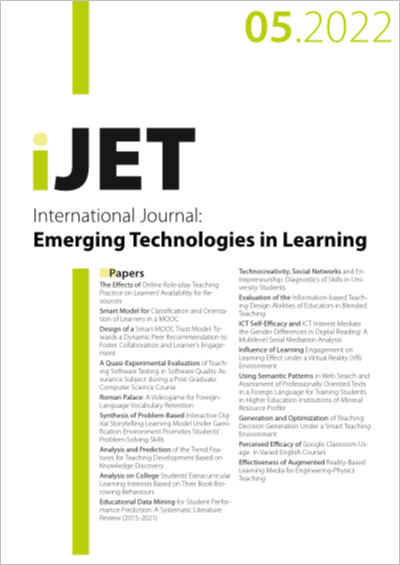Roman Palace: A Videogame for Foreign-Language Vocabulary Retention
DOI:
https://doi.org/10.3991/ijet.v17i05.27621Keywords:
serious game, mnemonics, method of loci, vocabulary, memorisation, foreign-language learningAbstract
The goal of this work was to develop a serious game which would aid in the retention of foreign-language non-contextualized vocabulary items in different age categories. To this end, the loci method was used to enhance visual and spatial memory among the game’s players. The novelty of this proposal lies in the combining of mnemonic strategies with the environment of an exploratory video game. Structurally, this project consists of three main pillars: pedagogical foundations, the development of the serious game, and the evaluation of the game's efficiency through qualitative and quantitative study. The 3D game was developed through the Unity game engine in its version 2020.3. The prototype’s efficiency was assessed quantitatively in an experimental group of 21 participants who were compared with a control group of 27 participants. All the data were displayed in R Studio using the ggplot2 library. The study was complemented with qualitative findings collected through semi-structured interviews with a group of 7 participants. The experimental method proved to be more efficient and more entertaining than the conventional method used in the control group.
Downloads
Published
2022-03-14
How to Cite
Larchen Costuchen, A., Mollá Vayá, R. P., & Dinkova Dimitrova, D. (2022). Roman Palace: A Videogame for Foreign-Language Vocabulary Retention. International Journal of Emerging Technologies in Learning (iJET), 17(05), pp. 87–102. https://doi.org/10.3991/ijet.v17i05.27621
Issue
Section
Papers
License
Copyright (c) 2022 Alexia Larchen Costuchen, Ramón Pascual Mollá Vayá, Darina Dinkova Dimitrova

This work is licensed under a Creative Commons Attribution 4.0 International License.



